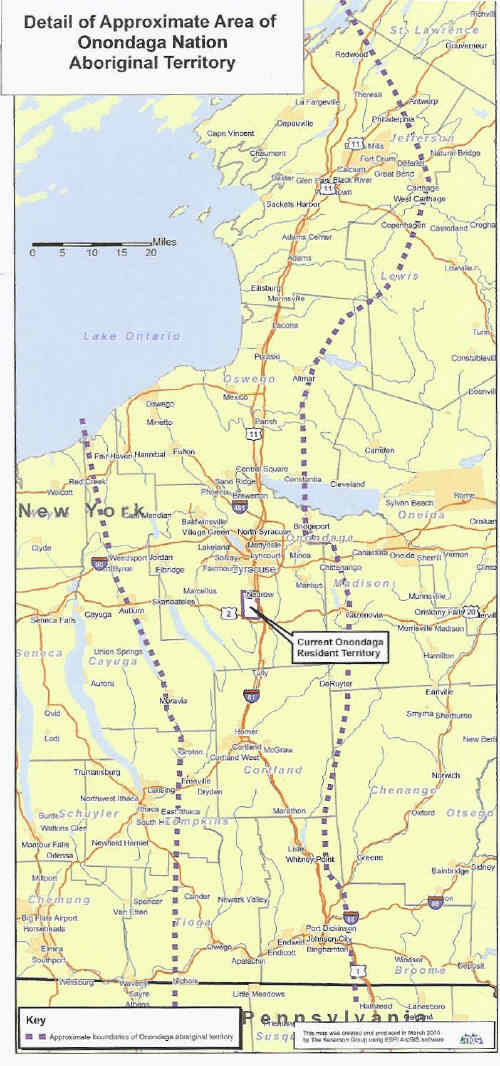The Land Rights Case
In 2005 – The Onondaga Nation filed a federal Lawsuit against the State of New York for the taking by the state of traditional Onondaga Homelands. The land rights action petitioned the U.S. Federal Court to declare that New York State violated federal law when it took Onondaga Land. The land area includes the Onondaga Nation’s historic territory, which encompasses not only Syracuse and Onondaga Lake, but stretches south past Binghamton and north past Watertown.
By 2010, the U.S. Federal Court ruled in favor of New York State by dismissing the Onondaga’s case. The court ruled that it would be “too disruptive” to the people of New York if they ruled in favor of the Onondaga Nation. The case was dismissed. Therefore, the facts of the case were never argued or disputed by the court.
In 2014, the Onondaga Nation then took the Land Rights Case to the World Court in the United Nations. As of 2020, the case has yet to be presented or argued.
The results of the Land Rights Case has landed the Onondaga Nation as a leader of Land Stewardship in Central New York. Fighting for Clean Air and Water for all not only today, but for the coming generations.
Opening Statement of the 2005 Land Rights case –
The Onondaga People wish to bring about a healing between themselves and all others who live in this region that has been the homeland of the Onondaga Nation since the dawn of time. The Nation and its people have a unique spiritual, cultural, and historic relationship with the land, which is embodied in Gayanashagowa, the Great Law of Peace. This relationship goes far beyond federal and state legal concepts of ownership, possession or legal rights. The people are one with the land, and consider themselves stewards of it. It is the duty of the Nation’s leaders to work for a healing of this land, to protect it, and to pass it on to future generations. The Onondaga Nation brings this action on behalf of its people in the hope that it may hasten the process of reconciliation and bring lasting justice, peace, and respect among all who inhabit the area. (Click to read the Land Rights Case)
The land rights action petitions the federal court to declare that New York violated federal law when it took Onondaga Land. The land area includes the Onondaga Nation’s historic territory, which encompasses not only Syracuse and Onondaga Lake, but stretches south past Binghamton and north past Watertown.
The Onondaga Nation is suing the State of New York, the City of Syracuse, Onondaga County, and five corporations for illegal land takings and damage inflicted on Central New York’s environment. The corporate defendants are:
- Honeywell International, Inc. which owns several industrial properties and toxic dumps along the southwest shore of Onondaga Lake. Honeywell and its predecessor companies operated various chemical plants from 1880-1980. The pollution from these operations transformed the lake from its pristine state into the most polluted body of water on this continent. View a timeline of Honeywell’s history on Onondaga lake. In November, 2005 the Onondaga Nation reported on the inadequate ‘cleanup’ plans for just one of Honeywell’s toxic sites. To read the report (.pdf) click here.
- Clark Concrete Company (recently purchased by Cranesville Block) and its subsidiary, Valley Realty Development, own a gravel mine in Tully that has degraded the headwaters of Onondaga Creek. The mining area contains areas of extreme archaeological and cultural sensitivity for the Onondaga Nation.
- Hansen Aggregates and its subsidiaries, which own the Jamesville Quarry. The quarry is the largest open pit mine in the state and sprawls across portions of the towns of DeWitt and LaFayette.
- Trigen Syracuse Energy Corporation, which owns an energy cogeneration plant in the Town of Geddes that burns a combination of coal and plastic/paper waste. The toxic emissions caused by burning these materials include large quantities of hydrochloric acid and dioxins.
The Onondaga will not settle for methods such as casinos that have been used to resolve other Native American claims.

